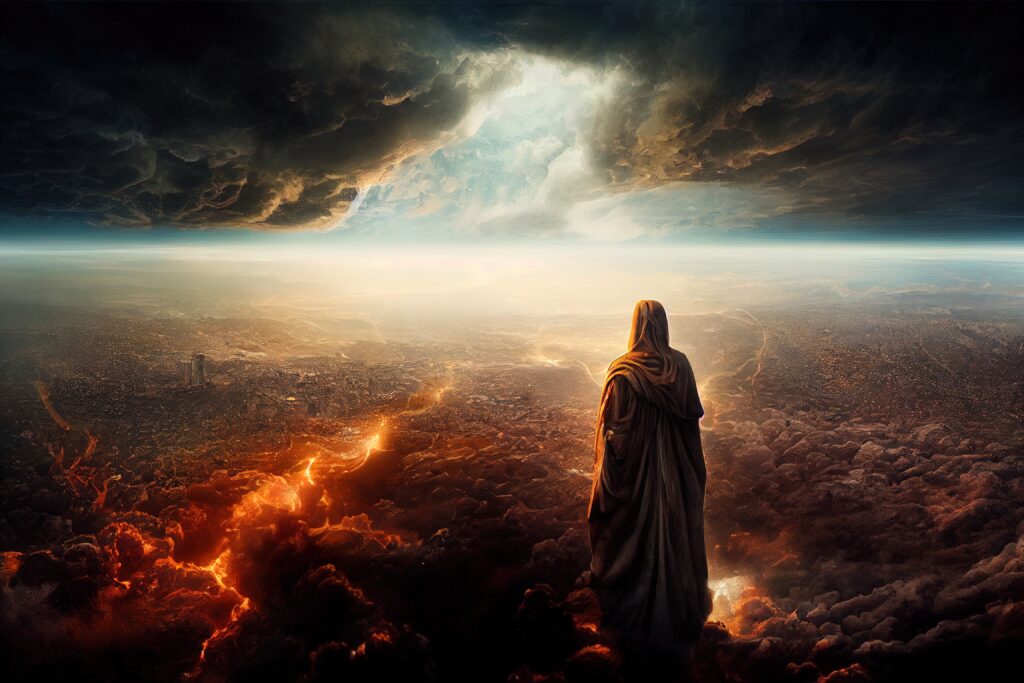
Important Interludes.
The opening of the seven seals showed us that every person who claims to believe in Christ will receive blessings for faithfulness. It also showed us the fate of the unfaithful and those who opposed the preaching of the gospel. The first four seals described God’s disciplinary means to rouse His people from their spiritual lethargy and make them victorious. Yet, God’s people also suffer injustice and oppression in a world hostile to the gospel. At the opening of the sixth seal, God is ready to deal with those who harmed His people. Chapter 6 ended with a question (V:17), and Chapter 7 answers that question: “who can stand” before the great and terrible day of God’s wrath? The answer is – those who have been sealed.
Chapter 7 is an interlude inserted parenthetically between the sixth and seventh seals. The “seal of God” is the opposite of “The Mark of the Beast.” We shall see that God’s end-time people are sealed with the Holy Spirit, the sign of God’s ownership, which leads to obedience. The Unsaved receive the mark of the Beast, which leads to disobedience.
We need to constantly remind ourselves that we are reading a Hebrew poetic narrative, that is built on real events, prophetically described in conceptual and symbolic language. Revelation seven continues the pattern and draws heavily on our knowledge of the Old Testament. The symbolism of this book is meant to be impressionistic – we are not to dwell too much on the details.
There is an interlude between the 6th and 7th seal. There is also an interlude inserted between the sixth and seventh trumpets (Rev 10:1 – 11:14). These interludes step us back in time.
In order to survive the calamities that accompany the lead up to the second coming, it is necessary to be sealed (Rev 7:1-3). The end result is a people who stand blameless in Christ before the throne of God. We have already noted the council to the church of Laodicea to buy white raiment (the covering of Christ’s Righteousness that makes us blameless) and not trust in anything apart from Him. We are the church that must be wearing the wedding garment of Christ’s righteousness if we are to stand on that day. (Matt 22:1-14).
The vision of the opening of the seven seals points symbolically to God’s care for, and discipline of, His people on earth. Throughout Scripture there is an assurance that God has always cared for His people: that in history itself He is ever present to sustain them, and that in the great end time finale He will give them full vindication and an incomprehensibly generous reward in life everlasting. The book of Revelation picks up and expands beautifully this same theme, and thus Revelation is not by any means some sort of offbeat apocalypse that is out of tune with biblical literature in general; it conveys the very heart and substance of the biblical message. Indeed, as Revelation emphatically points out, the ‘Living One’—the One who conquered death and the grave (1:18)—will never forsake His faithful followers and that even when they suffer martyrdom, they are victorious (12:11), with the ‘crown of life’ awaiting them (see 2:10; 21:1–4; and 22:4).
Chapter 7 is the interlude that takes place between Revelation 6:13 -14 (The 6th seal) and answers the question asked in the last line of chapter 6. “Who shall be able to stand.”

God is so good to me and I don’t deserve it. I remember when I realised that the parable of the talents shows us that God gives us power through his grace to live as he wants us to, then rewards us for what He enabled us to do. Oh the height and depth of love.
🙂
God has always been good to me i,ve never had all i wanted but the Lord has always made sure i,ve had everything i needed